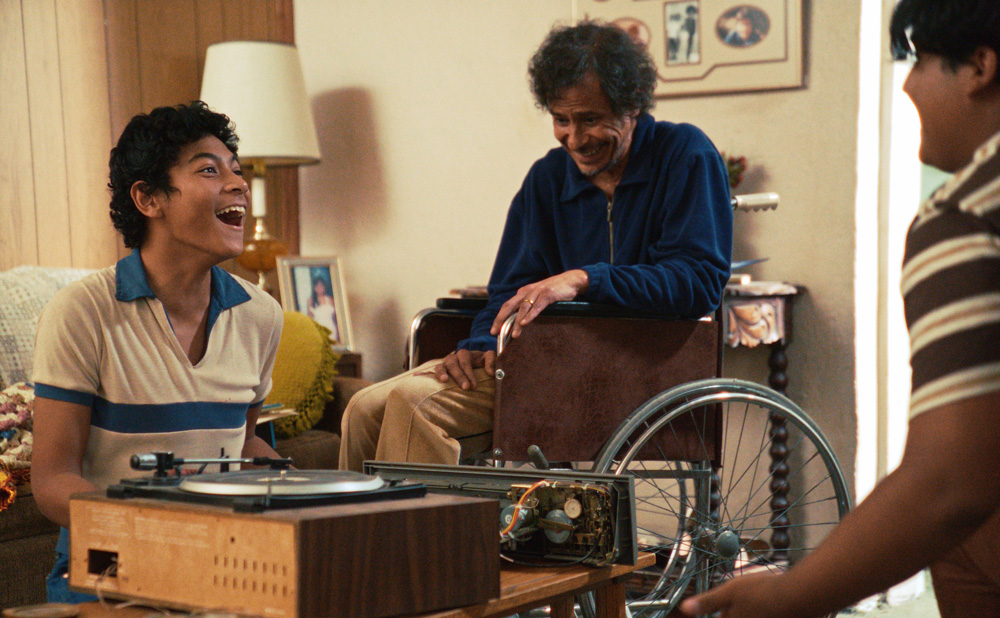There’s a treat early on for the fans of Fernando Eimbcke in “Olmo” as a radio quickly segues from news to rock ‘n’roll, the kind of greeting that seems entirely appropriate for the erstwhile Mexican filmmaker after ten years away since his last feature “Lake Tahoe.” Having first made his name following a group of rambunctious kids in “Duck Season,” it’s also immediately comforting to know he still hasn’t really grown up, introducing his latest with what turns out to be one big masturbation gag as the film’s 14-year-old title character (Aivan Uttapa) lusts after his next door neighbor Nina (Melanie Frometa). Yet while the scene may be hopelessly juvenile in some respects, as Olmo is shown to be piecing together a daydream from the limited areas of wonder to explore in his dusty home in a sleeping corner of Las Cruces, New Mexico – his mind set racing by the Matchbox car sitting along his bedside that functions as a key part of the fantasy – Eimbcke’s own glorious imagination is on full display in the coming-of-age tale where the boy needs to start manning up.
Eimbcke’s sensibilities may remain firmly rooted in childhood, but he is gifted at seeing the adults’ perspective as much as the kids in “Olmo,” in which the 14-year-old has to contend with watching over for his father Nestor (Gustavo Sanchez Parra), who was left debilitated by multiple sclerosis some time ago. Neither Olmo nor his slightly older sister Ana (Rosa Armendariz) want to be saddled with the responsibility of cleaning their father’s bedpan, particularly when he’s never too grateful for it, but it’s difficult for their mother Cecilia (Andrea Suarez Paz) to stay home for any length of time when her job at a local greasy spoon is what keeps the lights on and she’s become accustomed to taking double shifts. It doesn’t take much to throw the whole arrangement into chaos when Olmo has an opportunity to score points with Nina by bringing a stereo to a party she’s going to, yet has to work around the fact that Ana already has plans to go roller skating with her friends and Cecilia needs to work, leaving him the only one to care for Nestor.
The hijinks that ensue may feel slightly schematic as each decision Nestor makes is a thinly veiled rite of passage, but Eimbcke’s sharply perceptive script co-written with Vanesa Garnica is filled with so much authentic circumstantial detail that it hardly matters. Absence can be felt as much as presence throughout, both in the humble home of the Lopez family where money is tight and a barter system reigns so supreme that everyone adopts the same attitude towards emotional transactions as financial ones and the limited availability of Olmo’s parents leave him with little reference to come to his own conclusions, for better or worse. While the film operates strictly from his point of view with its endearing mischief, Eimbcke allows plenty of room to consider Nestor, who struggles with wanting to remain in control of the family as its patriarch when his body won’t allow him, unable to ward off Nina from smoking or Olmo from accidentally setting the kitchen on fire with his friend Miguel.
Although “Olmo” is set in the 1970s complete with a nod to “Saturday Night Fever,” Eimbcke continues a longstanding tradition of creating a space of his own separate from time, making a series of events that unfolds in a day really feeling as if it’ll last forever in the minds of its characters. The way cinematographer Carolina Costa will let light into a room, mildly dark even during the day when electricity is at a premium around the house, sets the mood for a place where the clock ticks on its own accord, and while living there may feel like it an eternity for those who can only see its limitations, Eimbcke sees a world of possibilities you won’t want to leave.
“Olmo” will screen again at the Berlin Film Festival on February 17th at 10 am at Cubix 5, February 19th at 4 pm at Cubix 7 and February 21st at Cubix 8.




